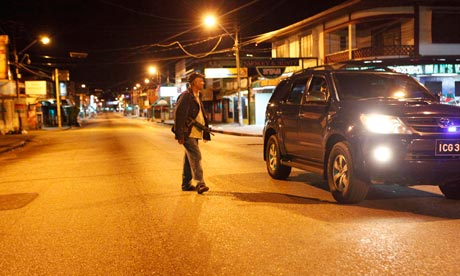By Carolyn Abdenour
Impunity Watch Reporter, Africa
ABIDJAN, Ivory Coast – On Friday, 19 August, the Ivorian government charged former President Laurent Gbagbo, 66, and his wife Simone Gbagbo, 62, with economic crimes including aggravated theft, damage to the national economy, misappropriation of public funds, and looting. Under current President Alassane Ouattara’s administration, officials arrested the couple in April after the five-month post-election dispute. This violence displaced 500,000 people and killed 3,000 people.

Since their arrest on 11 April 2011, the coupled lived under house arrest in separate cities in the northern part of the country. However, public prosecutor Koffi Kouadio Simplice reported officials charged and took Simone Gbagbo into custody on Tuesday before they charged Laurent Gbagbo on Thursday. Officials will transfer Simone Gbagbo to a prison in Odienné, the city where she lived under house arrest. Laurent Gbagbo will continue living under house arrest in Korhogo. This is the first time the Ivorian government stated the legal status of the couple since their arrest.
The BBC reports Laurent Gbagbo’s charges relate to his use of millions of dollars of state funds from the central bank while he attempted to retain power after the election. During the post-election struggle, the former president forcefully obtained control of the central bank’s local headquarters in addition to nationalizing foreign private banks.
Since the Ivorian government is only charging Laurent Gbagbo with economic crimes, the International Criminal Court (“ICC”) will be able to investigate the post-election violence if the judges accept Prosecutor Luis Moreno-Ocampo request. Prosecutor Ocampo has stated he also wants to investigate alleged crimes against humanity and war crimes that occurred during the post-election violence.
Mr. Kouadio stated the Ivorian justice system prefers the ICC prosecute the violence crimes. Mr. Bruno Koné, spokesman for the Ivorian government, stated the country “is not yet equipped to judge those kind of crimes”.
Previously, officials arrested and charged dozens of people who served under Laurent Gbagbo, including his son. Since the Ivorian government did not charge the couple for their crimes until now, human rights groups criticized the government for not charging them until months after their arrest. The United Nations also stated both political sides engaged in war crimes and crimes against humanity. Although President Ouattara enforces that participants in the violence on both political sides will face justice, he has not charged a member of his group for participating in the violence.
For further information, please see:
Nation – Gbagbo and wife charged with economic crimes – 19 Aug 2011
The Australian – Ex-Ivory Coast leader Laurent Gbagbo charged with ‘economic crimes’ – 19 Aug 2011
BBC – Ivory Coast conflict: Gbagbos face economic charges – 18 Aug 2011
Forbes – Ivory Coast’s ex-president charged with theft – 18 Aug 2011

